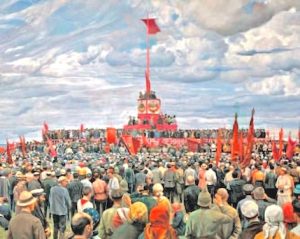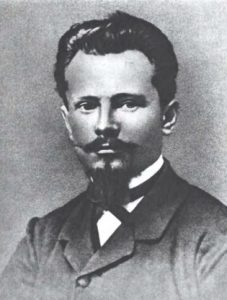Immigrant Workers and Soldiers: Key to Proletarian Revolution here ♦ Learning From the 1871 Paris Commune here ♦

MOSCOW, 1924: A tattered red flag rescued from the Paris Commune is raised again in the Soviet Union.
Immigrant Workers and Soldiers: Key to Proletarian Revolution
“When the plain working men for the first time dared to infringe upon the governmental privilege of their ‘natural superiors,’” wrote Karl Marx, “the old world writhed in convulsions of rage at the sight of the Red Flag floating over [City Hall] Working men’s Paris, with its Commune, will be forever celebrated as the glorious harbinger of a new society.”
Jarosław Dąbrowski and five hundred other Polish émigrés went to Paris to fight under the red flag. Most already had military experience—and hated repressive government.
Jaroslaw grew up in a Polish region under the heel of the imperialist Russian Tsar Nicholas I. At age nine, he attended a cadet corps school with older boys. The Tsar, inspecting the ranks, noticed and embraced him. But, discovering that the child was Polish, the Tsar roughly threw him to the ground.
Dąbrowski continued military studies. He later distinguished himself in the Tsarist army in the Caucasus. He entered the elite General Staff Academy in Saint Petersburg. There he found an illegal anti-Tsarist officers’ organization. Dąbrowski became a key member. He made contacts with anti-government officers in other cities.
He applied for a posting to the Warsaw Garrison. There he hoped to support or instigate a Polish uprising. By spring 1862, he led, informally, about four thousand “red” conspirators of the Warsaw underground. The “reds” wanted radical social change, not just Polish independence.
“The most important thing in a revolution is boldness and speed of action, as a result of which forces that are small at the beginning grow like an avalanche,” Dąbrowski said. He expected soldiers to seize control of the garrison and arrest officers who resisted.
The uprising was planned for Bastille Day, 14 July, but organizers were not ready. They rescheduled for 20 August. Delay could be fatal. Three officers had received death sentences for reading banned literature to colleagues. Also, the “white” nationalists might undercut them by making a deal with the Tsar.
All plans were cancelled after a failed assassination attempt on the governor led to massive shakeups of Russian troops and attacks on Poles.
Dąbrowski had been imprisoned in the Warsaw Citadel since 14 August. With the uprising foiled, he planned a mass jailbreak using weapons smuggled in by his fiancé Pelagia Zgliczyńska. But other prisoners were not willing.
Pelagia and Jaroslaw got married. She was imprisoned too. Eventually Dąbrowski was sentenced to fifteen years of hard labor in Siberia. But when he reached Moscow on his way there, a basket awaited him with women’s clothes hidden inside. He changed clothes, wrapped his head in a handkerchief, and went out quietly with the servants.
The Dąbrowskis escaped Russia in 1865 for France using false passports. There, Jarosław worked as a drafter and mapmaker. Like hundreds of Polish emigres, they saw hope in the rising French proletariat for the liberation of masses everywhere.
Paris Commune: Workers Take Power
In March 1871, Dąbrowski was in southern France, hoping to join the Italian revolutionary Garibaldi. When the French capitalist government failed to defend Paris from a Prussian siege, the Paris National Guard took over under the red flag of the Paris Commune. Masses joined them. Some French soldiers did, too.
Inspired by Paris, National Guards briefly established Communes in Lyons, Saint-Etienne, and Marseille.
Dąbrowski already knew many Paris revolutionaries. He was elected to the Council of the Paris Commune. The Commune made Dąbrowski and another Polish soldier, Walery Wróblewski, generals. Their nationality didn’t matter.
They struggled to turn the Paris National Guard – armed workers, not a standing army – into an offensive force to spread the revolution. That didn’t happen fast enough.
On May 21, the French capitalist army entered Paris to drown the Commune in a sea of blood. Dąbrowski, age 34, fell on a barricade during a week of fighting where as many as 15,000 died.
But in just two months the Commune had given the world – and us today – a taste of workers’ power. We have much to learn from its victories and its mistakes. Two important lessons: The working class has no nation! And soldiers are key to communist revolution!

Jarosław Dąbrowski
Learning From the 1871 Paris Commune
Like Marx, Engels, and Lenin before us, the ICWP has learned so much from the Parisian working women and men whose revolution marked a turning point for our class. You can read about it here. Marx’s pamphlet The Civil War in France explained that the Commune showed why workers can’t seize or take over the capitalist state. We must smash it and create entirely new forms of social organization.
Read our Pamphlet:
Soldiers, Sailors and Marines: Crucial for Communist Workers’ Revolution here

